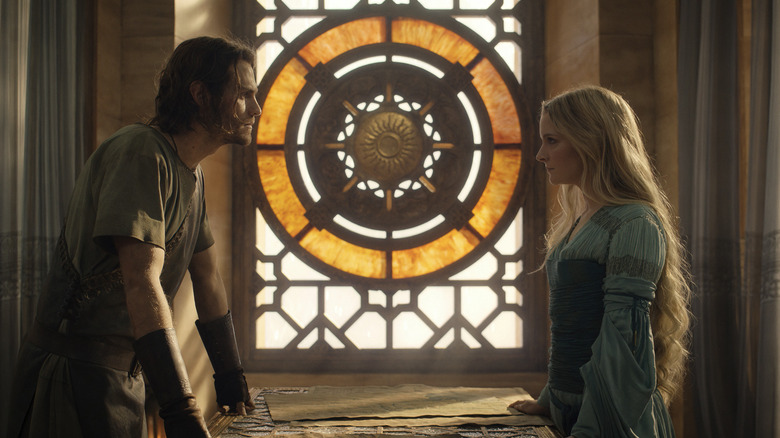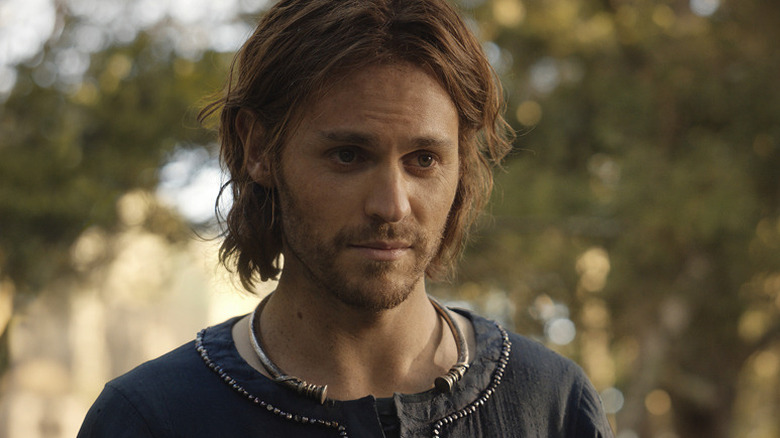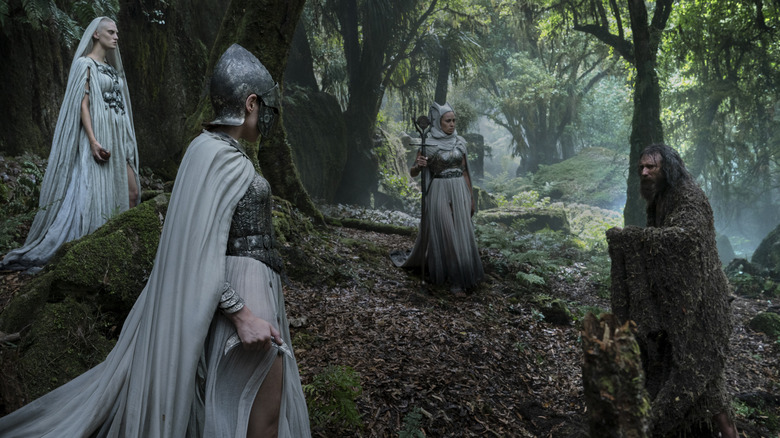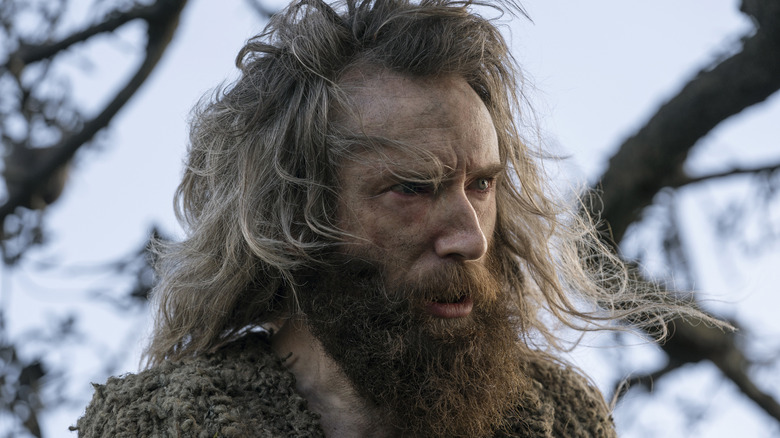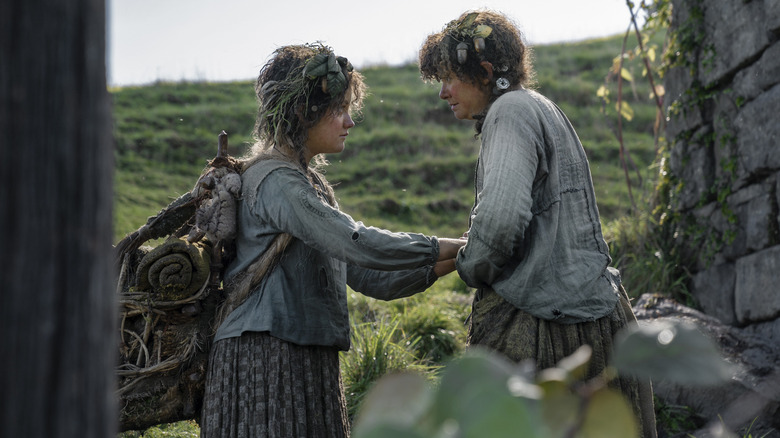The Rings Of Power Finale Writer Gennifer Hutchison On Sauron's Reveal, Shipping, And More [Exclusive Interview]
(Warning: Major spoilers ahead for the "The Lord of the Rings: The Rings of Power" season 1 finale.)
"The Lord of the Rings: The Rings of Power" season 1 has ended, and much has been revealed. After weeks of speculation, we know the identity of Sauron. We have a pretty good idea of who the Stranger (Daniel Weyman) is from some contextual clues and lines. We've seen Galadriel (Morfydd Clark) tested, and we've lost a harfoot. So much happened in the final hour of the season, including the forging of three rings of power for the elves. Instead of a giant battle at the end, we were taken back to characters and relationships.
I got a chance to chat with Gennifer Hutchison, who wrote this episode alongside showrunners J.D. Payne and Patrick McKay. (She also wrote the second episode, "Adrift.") Hutchison talked about balancing the information for fans with knowledge of J.R.R. Tolkien's work and those who are new to the lore, the temptation of Galadriel, shipping our fair elf and Halbrand (Charlie Vickers), and if the Stranger could have been turned to evil if not for some of the smallest residents of Middle-earth.
'It was really about tracking his journey'
The finale was such a gut punch! We finally got the reveal about Sauron and who the Stranger probably is. I'd love to hear the process of deciding how this was all going to play out and your take on it.
So, yes, we obviously identified Halbrand very early, as this was the endgame. And so really it was about laying out a storyline for him that felt consistent for Halbrand, but when you went back and looked at it as Sauron with that knowledge, it still felt consistent for that character and kind of gave you a second perspective of those scenes. So it was really about tracking his journey, what he says, his relationship with Galadriel, so it all feels consistent across both storylines, and then just building to that final confrontation and making sure that they're in this place where their friendship and their relationship is so solid and intimate that it blows the world apart for her at the end.
Since you said "intimate," I wanted to mention this because everyone has been shipping them [Galadriel and Halbrand]. There is no sex in this show, and yet there's a lot of tension. Was this a deliberate thing?
That's so funny! [laughs] I meant emotionally intimate ...
I figured!
No, it was not meant to be an overtly romantic relationship. It was meant to be this sort of meeting of the minds and this deep friendship. But of course, we knew that there would be shipping. It's fandom. There always is, no matter what. And I [in] particular, because I'm a big person in fan culture myself, I [in] particular was calling out and talking about that in the room. The guys were like, "No." And I'm like, "Just wait, Just wait." [laughs]
People will ship anyone!
If they appear on screen together, they're being shipped.
It's interesting that last week, we got a mention of [Galadriel's] husband, and it will be interesting to see if that shows up.
I will just say if you listen to exactly what she says, we'll have to see what happens.
'Great, this is my time to shine. I know this. This is what I do'
There's a lot of lore in this show. There are fans who know every little thing, there are fans like me who know a lot, but not everything, and then there are people who know nothing. How do you balance what you're going to show and what you're going to rely on knowledge for?
It's really tricky, because you want the show to work for everybody. It's funny because I had a little bit of experience with this when I was on "Better Call Saul," because there were people who watched the show who had not watched "Breaking Bad." And so I was always like, "We've got to make sure that if we pop up this character, we're not just relying on people who've seen [that] show."
So it's really about walking a fine line of wanting to say just enough to catch up the people who don't know the lore, and also make the people who do know the lore feel like, "Oh great, okay, seeing this is the world I know," without getting overly explain-y. And so much of it is about how each group talks. The elves have a very specific way of talking to each other as opposed to the dwarves and the harfoots. And so that allows you actually to kind of lay in lore in different ways through character dynamics.
This finale, it's interesting because [there] was such a big fight scene and the aftermath of fight scenes [earlier] and all that, but this [episode] was very character-driven. I'd love to hear your thoughts on bringing it back down to each of the characters.
So character is my wheelhouse. That's the zone I love to live in. I love spectacle, too, don't get me wrong, but when we were talking about this, and the guys said that they wanted me to be working on this episode, it was like, "Great, this is my time to shine. I know this. This is what I do." So it was really taking all those things that we had built up and really paying them off. I love that stuff. I love the complexity of that.
And taking a huge thing like the reveal of Sauron and making it about the relationship of two people, that's the stuff. So I was super excited about those scenes. I know they were intimidating as well, but being able to just think about, "These are two people. One has betrayed the other. The one who's betrayed them is trying to convince them, 'No, no, no, no, we can do good.'" If you can get that foundation, then you can start expanding what the larger scope of it is.
'I think that's a thing that people could speculate on'
It's interesting when Sauron is saying all these things to Galadriel, he's not outwardly dark. So what was it like, crafting the sentences that he was saying?
Really fun, because you want to be able to read it — I always like to be able to read it both ways. I like to read it as sincere and manipulative. And so being able to really craft it in that way, it's tricky, but you're going, you're revising, you're just doing it over and over again until you really get that. Then having someone like Charlie Vickers playing that against Morfydd, it's so wonderful because they can play all those emotions and the margins between the lines, too. So you're able to really get that. They did such a fantastic job, that I was like, "Great. Perfect."
I know when you get chosen for specific episodes, you're still breaking it down [in the] writers' room and all of that. So how did you all split the duties for this episode?
So as all the writers in the writers' room, we broke the whole season together, and we broke every episode down fairly together as a group, like the beats. And then for this episode, J.D., Patrick, and I, we all had a hand in crafting every scene together. We all wrote all the scenes together. So it was really about me doing a draft and talking to them and shifting here, and then them doing a draft and then coming back. And so it was really a very collaborative working relationship in that way while still pulling from the collective room as well and all that. Those people, the rest of the writing staff is so amazing, all that brain power together.
I'm really curious about the scene where Galadriel is tempted. Obviously, that was a huge scene, but it also really calls back to the Peter Jackson films, that moment where she's tempted again. How much did you look back at that?
Yes, we definitely looked at that scene of temptation, which is such a kind of amazing scene with Galadriel because she's been so untouchable and regal up until then, and then she becomes dark. And the question was like, "There's some potential there. What would get someone to that place? How did the stoic person have that inside of her?" So we really wanted to play with that and show that and also show the idea of, this wasn't the first time she was tempted. So it kind of takes on hopefully this sort of added layer of, "No, I really passed the test because I'm being tested again." But yes, we absolutely looked at that scene so much and that exchange and built on it for this sequence.
I love the Stranger character so much. But it's so interesting that there were moments where he could have gone either way. And I'm wondering for you, do you feel like if the harfoots weren't there, if Nori wasn't there, if he hadn't been accepted, could he have gone a different way?
That's a really good question. I mean, I think that's a thing that people could speculate on. For me personally, I mean he's definitely very influenceable in that point, and I love the idea of the harfoots who are very small and the world doesn't know, having such a significant impact. And for them to direct a clearly powerful person down a good path, I love that idea. That's very Tolkienian to me — that the smallest among us can make a big difference.
'I cried when I wrote that scene'
How much did you have input in terms of what you were actually physically going to see? Because there are moments where the Eye is there, there are moments where it's implied. Do you know where those things are going to show up?
We write very visually, but obviously, once the director comes in and the designers and bringing all the artists in, they really just take that base and then just build on it. So some of that stuff is stuff that we're intentionally calling out in the scripts, but the thing with the show is there were so many wonderful creatives just adding to it, that they just turned it into such an amazing sequence. All the eye stuff, I thought was so beautiful, the matching there. And that's totally on the director and craftspeople and all that.
When you come back for season 2, I know you can't tell us plans, but in your head, do you want to see a time jump? Do you want to see immediately where we left off?
I feel like we really set people on paths at the end of the season and the intention really is to continue that story. And whether that feels like an immediate pickup or if some time needs to pass, I think it's really open to what people think it could be going forward.
I don't mind changes from lore. I actually kind of think that's fun because you're updating. But I know there are some people who are sticklers. How did you navigate that: What you felt you could change, what you felt you didn't want to, or maybe stuff we haven't noticed yet?
Yes, again, the show is not over, so stay tuned on a lot of that. [laughs] No, it's really about, we're so immersed in the text, we consult it constantly. So as much as we can, we're hewing to it and it's really about the form of TV and the format of storytelling demand slightly different things. So we were really focusing on capturing the spirit, if we could find ways to integrate those scenes, even if they weren't necessarily in the same place or the same context, having those there to really ground it in the text. So it was really about, when can we be really close to the text? And when we can't be, how can we bring it in other ways?
I have to ask about the final scenes with the harfoots because of Sadoc (Lenny Henry) and the goodbye scene and the sunrise. It was all so beautiful. Can you write that without crying?
It's funny you say that, because the Nori goodbye, when she says goodbye to her family and Poppy, I cried when I wrote that scene, and I cried every time I revised it. So no, I could not get through it without crying.
"The Lord of the Rings: The Rings of Power" season 1 is streaming in its entirety on Prime Video.
